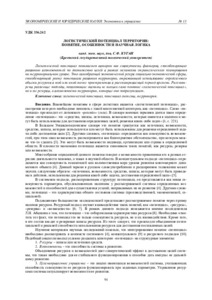Please use this identifier to cite or link to this item:
https://elib.psu.by/handle/123456789/23157| Title: | Логистический потенциал территории: понятие, особенности и научная логика |
| Authors: | Куган, С. Ф. |
| Issue Date: | 2018 |
| Publisher: | Полоцкий государственный университет |
| Citation: | Вестник Полоцкого государственного университета. Серия D, Экономические и юридические науки. - 2018. - № 13. – С. 91-94. |
| Abstract: | Логистический потенциал понимается автором как совокупность факторов, способствующих развитию возможностей по достижению целей в рамках механизма стратегического планирования на территориальном уровне. Это своеобразный экономический резерв социально-экономической сферы, способствующий росту потенциала развития территории, отражающий использование определенного объема ресурсов в той или иной точке пространства в рассматриваемый период времени. Рассмотрены различные подходы, позволяющие оценить не только само понятие «логистический потенциал», но и те резервы, и возможности территории, которые оно подразумевает.= Logistical potential is understood by the author as a set of factors that contribute to the development of opportunities to achieve goals within the framework of the strategic planning mechanism at the territorial level. This is a kind of economic reserve of the socio-economic sphere that contributes to the growth of the development potential of the territory, reflecting the use of a certain amount of resources at a particular point of space in the period under consideration. Different approaches are considered in the article, allowing to evaluate not only the very concept of “logistical potential”, but also those reserves and the possibilities of the territory that it implies. |
| Keywords: | Государственный рубрикатор НТИ - ВИНИТИ::ОБЩЕСТВЕННЫЕ НАУКИ::Экономика и экономические науки Логистический потенциал Потенциал системы Территория Logistical potential System potential Territory |
| URI: | https://elib.psu.by/handle/123456789/23157 |
| metadata.dc.rights: | open access |
| Appears in Collections: | 2018, № 13 |
Items in DSpace are protected by copyright, with all rights reserved, unless otherwise indicated.
